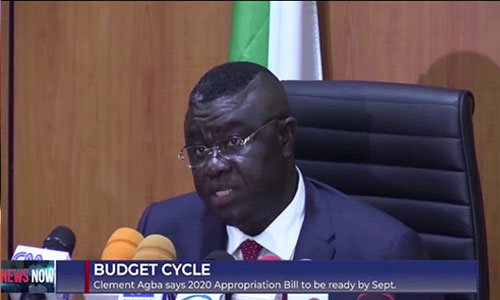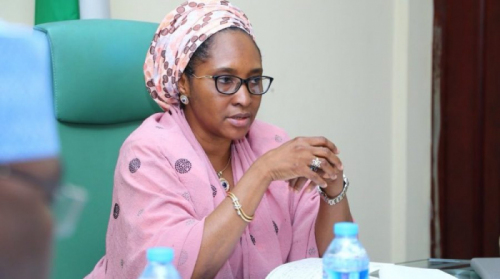THE EXECUTIVE 18/12/2022
2023: Again, Buhari Assures of Credible Polls Acceptable to All Contestants

President Muhammadu Buhari has previewed the forthcoming general election scheduled for the first quarter of 2023 in Nigeria with a declaration that his administration would conduct a credible poll that would be acceptable to all candidates participating in the exercise.
The president made this commitment on Friday in Washington DC, the United States capital, at an interactive session entitled, “A conversation with President Muhammadu Buhari of Nigeria’’, co-hosted by the United State Institute of Peace (USIP), the International Republican Institute, the National Endowment for Democracy, and the International Foundation for Electoral Systems.
Buhari, according to a statement issued yesterday by his spokesperson, Mallam Garba Shehu, reiterated his avowed determination to ensure the conduct of free, fair and transparent national elections in 2023, whose outcome would be largely accepted by the contestants.
He stated that the Independent National Electoral Commission (INEC) has no reason not to be ready for next year’s elections, insisting also that no local government area in Nigeria is under the control of Boko Haram.
He noted that the conduct of elections in Nigeria has continued to improve since 2015.
“From the 2019 general election, the by-elections and the off-season elections in Edo, Ekiti, Anambra and Osun states were conducted in largely improved contexts to the satisfaction of contestants and voters.
‘‘That is what we hope for in 2023. Through the observatory roles of the international community, the credibility of the elections can be further enhanced to make the acceptability of the outcome to the contestants and political parties a non-issue,’’ Buhari explained.
Commenting on the readiness of INEC to conduct the 2023 elections, the president said INEC is ready “because I made sure they were given all the resources they asked because I don’t want any excuses that they were denied funds by the government.”
President Buhari also revealed that Nigeria’s agricultural revolution has created over 13 million direct and indirect jobs in the last seven and half-years.
He advised western nations not to be in a rush to eliminate the usage of fossil fuels in a bid to ensure a healthy climate.
Buhari also cautioned western nations against the frivolous issuance of travel advisories on Nigeria, urging the international media to be more objective in its reportage of the country.
He told the international community that despite the non-nonchalant actions and attitudes of some of its friends and allies, Nigeria is nonetheless winning the war on terrorism, making significant progress in dealing with the threats to Nigeria’s and the sub-region’s safety and survival.
President Buhari also called on the United States to do more to improve the quality of governance in the West African sub-region, warning that the survival of democracy is being challenged in the aftermath of the democratic set-backs witnessed in Mali, Guinea and Burkina Faso.
Expounding on steps taken by his administration to expand Nigeria’s economy since coming into power in 2015, the president said focused interventions in agriculture driven by the Central Bank of Nigeria (CBN) transitioned the country from being a net importer of rice, Nigeria’s staple food, to becoming self-sufficient in its production.
‘‘This Agricultural revolution has led to the creation of over 13million direct and indirect jobs,’’ he said.
‘‘The non-oil sector remains the future of our economy and I hope successive governments will consolidate on the gains we have recorded under my leadership.
‘‘You will agree with me that the Russia-Ukraine war has compelled many economies to carry out reforms and re-adjust policies to cope with the challenges posed by the conflict,’’ he said.
On the rush to eliminate the usage of fossil fuels by some developed nations, the president recounted that as a member of the global community, Nigeria had participated in several rounds of talks regarding climate change and various decisions emerging from COP26 and the just concluded COP27.
‘‘But as I stated in my Washington Post article, there can’t be double standards, wherein Western nations use their influence and weight to turn the taps off global financing for fossil fuel transactions which are much needed by developing nations, yet when they feel the pinch they are quick to turn on their coal-powered plants.
President also said no local government area in Nigeria is under the control of Boko Haram terrorists.
He, however, acknowledged that Nigeria and other countries in the West African region have been negatively impacted by the events in Libya, Central Africa Republic, The Sahel and the war in Ukraine.
‘‘Our region is awash with small and light weapons that continue to seamlessly circulate as well as cope with the influx of foreign fighters,” he added.
President Buhari commended the Nigerian Armed Forces and the Multi-national Joint Task Force, consisting of Chad, Niger, Cameroon, Benin Republic and Nigeria, for demonstrating great bravery in the fight against terrorism, while paying the ultimate price in securing collective freedom.
‘‘We are, nonetheless, winning the war and making significant progress in dealing with the threats to Nigeria’s and the sub-regions safety and survival.
‘‘This steady progress is despite the negative reportage in international media as well as the nonchalant actions and attitudes of some of our friends and allies to sufficiently appreciate our efforts in the fight against terrorism.
“Rather than focus on negativity, which is what Travel Advisories have become, Nigeria, the sub-regions of Africa and the rest of the world can work more concertedly together to combat terrorism and prevent violent extremism, both of which are challenges to global peace and stability and not just Nigeria and Africa alone,” he explained.
The president disclosed that Nigeria is on the verge of commissioning her New Counter Terrorism Centre that would serve as a hub for counter-terrorism coordination and research in West Africa.
Speaking on democracy in West Africa, Buhari said Nigeria would ‘‘aggressively work together to improve the quality of governance in the West African sub-region, where the survival of democracy, is currently challenged.’’
‘‘The recent reversals witnessed in Mali, Burkina Faso and Guinea are most unfortunate indeed and ECOWAS continues to effectively remain engaged with these countries to restore democracy to all the Member-States of ECOWAS as indeed the entire African Continent.’’
President Buhari thanked Ambassador Johnnie Carson, a former US Assistant Secretary of State for African Affairs, and his team for inviting him back to the Institute after the last visit in 2015.
‘‘When I met you in 2015, I was not unaware of the enormous domestic and international goodwill that I attracted.
Although I am a converted democrat, and not your run-of-the-mill politician and therefore, less inclined to engage in double-talks.
‘‘My advisers may not be happy with me in this regard. I am, however, measured in speaking but always certain that the truth I shall speak and this has huge consequences in a political space wherein this is an exception rather than the norm,’’ Buhari concluded.



